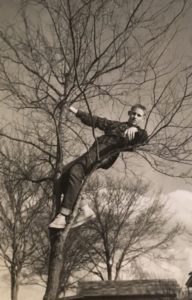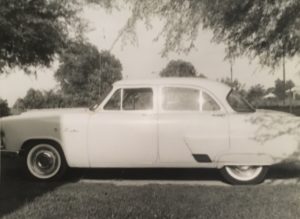 The driver of car number one, a four-door Ford sedan heading east with three passengers, slowed and dimmed his headlights as he passed the last house on the narrow street. The moon slipped behind growing rain clouds as he eased up to the intersection, stopped, and looked up and down the highway. It was late and traffic was light.
The driver of car number one, a four-door Ford sedan heading east with three passengers, slowed and dimmed his headlights as he passed the last house on the narrow street. The moon slipped behind growing rain clouds as he eased up to the intersection, stopped, and looked up and down the highway. It was late and traffic was light.
Three blocks north, the driver of car number two, a Chevy hardtop with two passengers, also slowed and dimmed his headlights as he approached the highway from the opposite direction.
The fellow riding shotgun in the Ford said, “I’m sure I saw him over there when we came past the mill a while ago. He was going away from the highway, so he’s got to still be over there somewhere.”
The fellow sitting behind the driver in the Chevy said, “Go on. Gun it. I don’t think he knows where we are. And even if he sees you coming, he can’t get away. You’re faster.”
“Yeah,” the Chevy driver said, “but I don’t want anyone else to see us either.”
“Aw, go on,” his passenger said. “You saw the marshal parked back yonder. He’s probably still sitting there.” Egged on, the driver took a quick look up and down the highway, hit the gas, burned rubber, and sped across the highway.
 At that same moment, the Ford driver did the exact same thing, and the two cars raced past each other, crossing the highway three blocks apart as if their movements were choreographed. The only difference was that the Ford hit a pothole and bounced the passengers’ heads off the roof. This was the late 1950s, before seat belts.
At that same moment, the Ford driver did the exact same thing, and the two cars raced past each other, crossing the highway three blocks apart as if their movements were choreographed. The only difference was that the Ford hit a pothole and bounced the passengers’ heads off the roof. This was the late 1950s, before seat belts.
The passengers in each car saw the other one and leaned out rolled-down windows—it was summer and still hot, even near midnight with rain in the air—and waved their fists. “Head for the mill,” the fellow riding shotgun in the Ford said. “We can hide there.” The driver turned on his high beams and hightailed it as fast as he dared.
These fellows might have been gang members chasing each other. Or, one car might have been carrying crooks and the other some sort of law officers. Or, one car might have been carrying spies and the other FBI agents. But they weren’t. These were teenage boys with nothing else to do for excitement on a Sunday night in a small southern town, and they wanted to impress the cousin of one of the guys in the Ford—a kid visiting from the big city of St. Louis.
And impress him they did. The next morning at breakfast, the kid detailed his entire evening adventure to his cousin’s parents. “What did they say?” I asked, when my friend told me about it.
“You don’t really want to know,” he said. “Momma told me, ‘you tell that Rollie Adams he has torn his britches with me.’”
Her remark didn’t require translation. I worried for days that she would tell my parents about our dangerous little game of chase—especially since the other driver and I had already been ratted on for joining other boys in a contest to see who could leave the longest gashes when spinning out on a newly surfaced pea-gravel-and-blacktop road. Later I figured out she knew that letting me worry about what she might do was the best way to make sure we toed a proper mark. And that doesn’t even count how uncomfortable I was every time I had to sit through church with her up in the choir looking out at me while holding the power to get me grounded with one phone call.
Mothers really can know best, can’t they? Even when they’re not yours.
To be notified of new posts, please email me.